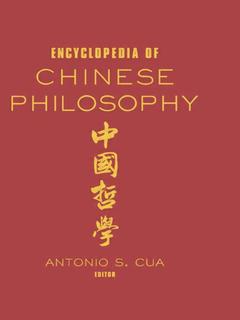Description
Encyclopedia of Chinese Philosophy
Language: English
Subject for Encyclopedia of Chinese Philosophy:
Keywords
CUA; Vice Versa; Liu Xin; Mao Zedong; Song Ming Confucian; Lu Ji; Xiong Shili; Mou Zongsan; Song Ming neo-Confucians; Fang Dongmei; Shen Buhai; Zhu Xi; Gongsun Long; Wang Yangming; Follow; Han Feizi; Wang Bi; Tang Junyi; Dong Zhongshu; Chinese Philosophy; Zhang Zai; Han Fei; Zhou Dunyi; Mou Tsung San; Wang Fuzhi
Publication date: 06-2012
Support: Print on demand
Publication date: 01-2003
1100 p. · 21x28 cm · Hardback
Description
/li>Contents
/li>Biography
/li>Comment
/li>
Featuring contributions from the world's most highly esteemed Asian philosophy scholars, this important new encyclopedia covers the complex and increasingly influential field of Chinese thought, from earliest recorded times to the present day.
Including coverage on the subject previously unavailable to English speakers, the Encyclopedia sheds light on the extensive range of concepts, movements, philosophical works, and thinkers that populate the field. It includes a thorough survey of the history of Chinese philosophy; entries on all major thinkers from Confucius to Mou Zongsan; essential topics such as aesthetics, moral philosophy, philosophy of government, and philosophy of literature; surveys of Confucianism in all historical periods (Zhou, Han, Tang, and onward) and in key regions outside China; schools of thought such as Mohism, Legalism, and Chinese Buddhism; trends in contemporary Chinese philosophy, and more.
Entries include: Aesthetics * Buddhism in China * Chen-Jen (true person) * Ch'eng I * Chün-Tzu (ethically superior person) * Confucian Tradition * Confucianism in Japan * Ethical Argumentation * Intercultural Hermeneutics * Jen (benevolence) * Later Mohism * Legalism * Mao Tse-Tung * Mou Tsung-San * Mythology and Early Chinese Thought * Philosophy of Literature * Pi (obscuration, blindness) * Problem of Translation * School of Names * Tao (way) * Wang Fu-Chih * Yang Chu * Yu-Wu (being, non-being) * and many more.
Antonio S. Cua, currently on the faculty at The Catholic University of America, is a past president of the Society for Asian and Comparative Philosophy, and past president and chairman of the Executive Board of the International Society of Chinese Philosophy. Professor Cua's works include Ethical Argumentation: A Study in Hsün Tzu'sMoral Epistemology, Unity of Knowledge and Action: AStudy in Wang Yang-Ming's Moral Psychology, and many other books and journal articles.




